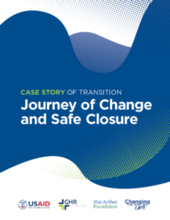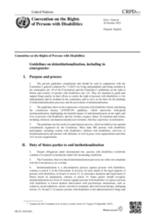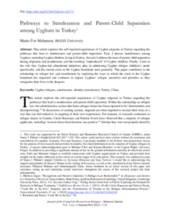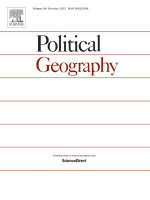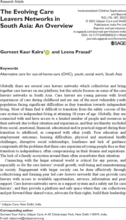Displaying 951 - 960 of 10391
The Journey of Change and Safe Closure case story demonstrates the process of early engagement and awareness to supporting the long-term reintegration of children in families.
These guidelines complement the Committee’s General Comment No. 5 (2017) and its guidelines on the right to liberty and security of persons with disabilities. They are intended to guide and support States parties, in their efforts to realize the right of persons with disabilities to live independently and be included in the community, and to be the basis for planning deinstitutionalization processes and prevention of institutionalization.
In this theoretical paper, the authors argue that, due to the detrimental impact of parental loss on academic achievement in France, orphaned students should be considered as students with special educational needs. This is important to provide appropriate educational responses consistent with inclusive education.
Despite rising numbers of unaccompanied child migrants in the Americas, very limited research directly engages with youth as they journey north to seek protection in the United States. In this article, the authors examine young Central American migrant experiences of bordering, focusing on policing and shelter management.
This article focuses on some of the care leavers networks in South Asia.
Under the auspices of the Ukraine Children’s Care Group, one of two learning events were held in July and September 2022. This event, "Addressing the need for foster care in the context of the Ukraine crisis", was held on September 7th in collaboration with HDPI. It focused on better understanding the foster care systems and services in Ukraine and neighbouring countries hosting Ukrainian refugee children, specifically Poland, Romania, and Moldova.
Global totals and country comparisons were previously hampered by inconsistencies in COVID-19 testing and incomplete death reporting. The new orphanhood estimates derived here based on excess deaths provide a comprehensive measure of COVID-19’s longterm impact on orphanhood and caregiver loss.
This U.S.-based study seeks to determine if COVID-19 has resulted in unique impacts on foster care alumni, and if these impacts are the same for LGBTQ+ and non-LGBTQ+ transition age youth.
This article addresses the predicament of family service systems being built on parents’ voluntary participation and the need for parental consent, which may block children’s right to services. It examines parental consent and the impact of parental non-consent for children’s opportunities to receive protection and support in Swedish child and family welfare.
This report reviewed evidence for the effects of psychosocial neglect on development derived from studies of young children raised in U.S. institutions. In these caregiving environments, children are physically safe and receive instrumental care, but the social, emotional, and cognitive components of caregiving are impoverished. The damaging and often lasting effects of these caregiving environments on young children's development underscore that psychosocial neglect should be considered as dangerous to child well-being as physical maltreatment.

